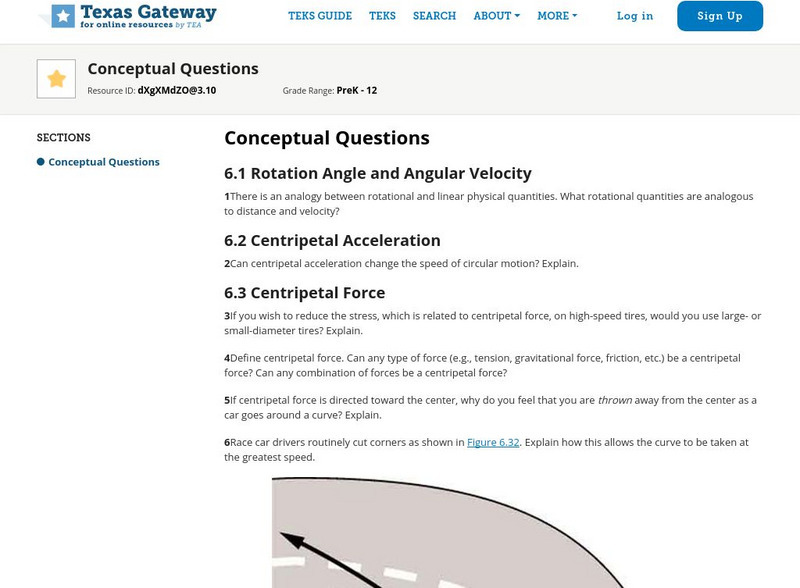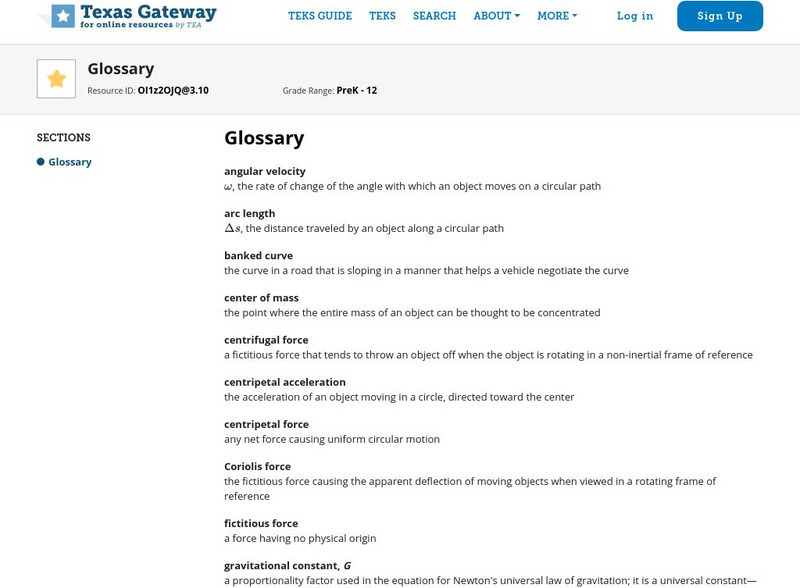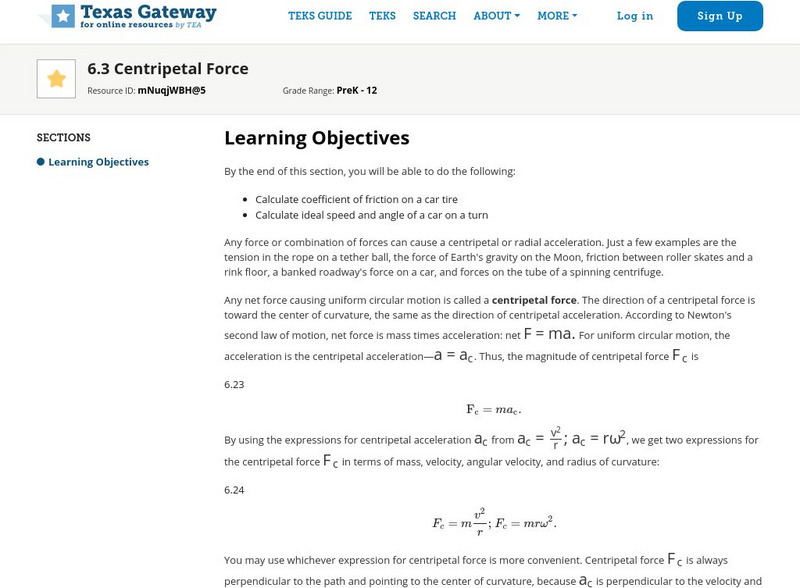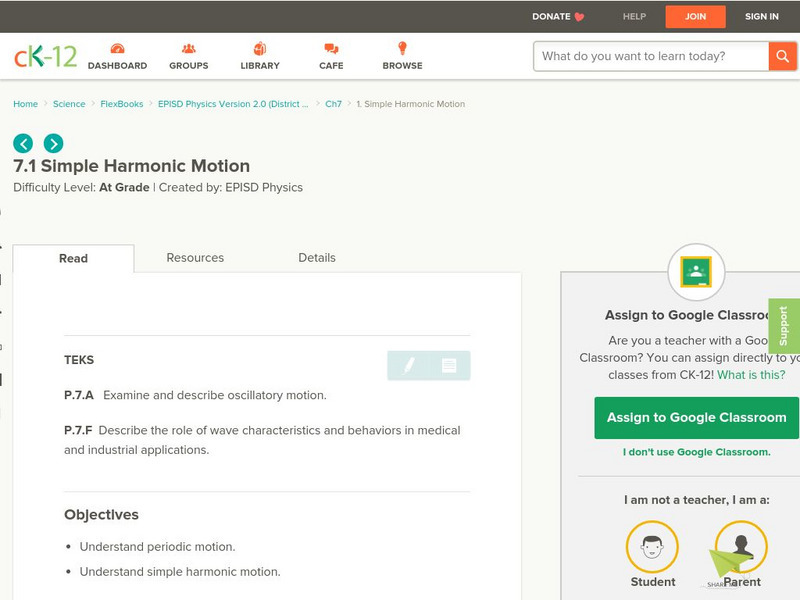Texas Education Agency
Texas Gateway: Ap Physics: Uniform Circular Motion and Gravitation: Questions
This is a list of 23 questions covering the major concepts of Chapter 6: Uniform Circular Motion and Gravitation from the AP Physics online text.
Texas Education Agency
Texas Gateway: Uniform Circular Motion and Gravitation: Problems and Exercises
This page offers a list of 50 problems/exercises to solve based on the content of Chapter 6: Uniform Circular Motion and Gravitation from the AP Physics online text.
Texas Education Agency
Texas Gateway: Uniform Circular Motion and Simple Harmonic Motion
By the end of this section, you will be able to compare simple harmonic motion with uniform circular motion.
Khan Academy
Khan Academy: Uniform Circular Motion and Centripetal Acceleration Review
Review the key concepts, equations, and skills for uniform circular motion, including centripetal acceleration and the difference between linear and angular velocity.
Texas Education Agency
Texas Gateway: Ap Physics: Uniform Circular Motion and Gravitation: Summary
This page features a summary of each section of Chapter 6: Uniform Circular Motion and Gravitation from the AP Physics online text.
Texas Education Agency
Texas Gateway: Ap Physics: Uniform Circular Motion and Gravitation: Glossary
This is a glossary of terms and definitions used in Chapter 6: Uniform Circular Motion and Gravitation from the AP Physics online text.
Physics Classroom
The Physics Classroom: Circular, Satellite, Rotational: Uniform Circular Motion
Uniform circular motion can be described as the motion of an object in a circle at a constant speed. This animation depicts this by means of a vector arrow.
Sophia Learning
Sophia: Components of Circular Motion
A video lesson that introduces the components of circular motion. Understand that any objects that rotates around a point is in circular motion. Video also explores how to measure how far an object has rotated. Video gives equation for...
Physics Classroom
The Physics Classroom: Circular & Satellite Motion: Uniform Circular Motion
Manipulate variables while exploring principles and relationships related to moving in a circle at a constant speed. Students change the radius of the circle, the speed of the object, and the mass of the object and investigate the effect...
Open Curriculum
Open Curriculum: Circular Motion
Students learn about uniform and non-uniform circular motion in this illustrated article.
Texas Education Agency
Texas Gateway: Uniform Circular Motion and Gravitation: Centripetal Acceleration
By the end of this section, you will be able to establish the expression for centripetal acceleration and to explain the centrifuge.
Texas Education Agency
Texas Gateway: Uniform Circular Motion and Gravitation: Centripetal Forces
By the end of this section, you will be able to calculate coefficient of friction on a car tire and to calculate ideal speed and angle of a car on a turn.
Learn AP Physics
Learn Ap Physics: Physics B: Circular Motion
A site dedicated to help students prepare for the AP Physics B test. This specific site reviews circular motion including uniform circular motion, torque, rotational statics, gyroscopes, moment of inertia, and static equilibrium. Site...
Walter Fendt
Walter Fendt: Uniform Circular Motion
This app simulates circular movement and demonstrates how the position, speed, acceleration, and the applied force vary depending on the time. You may choose the option "slow animation" to make the movement ten times slower. You can also...
CK-12 Foundation
Ck 12: Harmonic Motion
[Free Registration/Login may be required to access all resource tools.] Students explore periodic motion and simple harmonic motion by watching video clips, manipulating interactives, and solving practice problems.
Georgia Department of Education
Ga Virtual Learning: Ap Physics 1: Simple Harmonic Motion
In this unit, students will discover the period of time of one oscillation, the frequency of oscillation, the object displacement, its velocity, and its acceleration. They will also discover how to apply the principles of conservation of...
OpenStax
Open Stax: Physics: Angular Acceleration
From a chapter on Rotational Motion and Angular Momentum in a Physics textbook. This section of the chapter discusses uniform and non-uniform circular motion, how to calculate angular acceleration, and the relationship between linear and...
Texas Education Agency
Texas Gateway: Ap Physics: Angular Acceleration
By the end of this section, you will be able to describe uniform circular motion, explain nonuniform circular motion, calculate angular acceleration of an object, and observe the link between linear and angular acceleration.
CK-12 Foundation
Ck 12: Universal Law of Gravity
[Free Registration/Login may be required to access all resource tools.] Using Newton's Law of Gravity and the equations of uniform circular motion, students solve problems involving the force of gravity.
Texas Education Agency
Texas Gateway: Circular Motion & Gravitation: Rotation Angle & Angular Velocity
By the end of this section, you will be able to define arc length, rotation angle, radius of curvature, and angular velocity; and to calculate the angular velocity of a car wheel spin.
Texas Education Agency
Texas Gateway: Oscillatory Motion and Waves: Summary
This page provides a summary for each section of Chapter 16: Oscillatory Motion and Waves from the AP Physics online text.
Texas Instruments
Texas Instruments: Centripetal Acceleration
In this activity, students observe the centripetal acceleration of an object in uniform circular motion. Relate the changes in velocity and radius to the centripetal acceleration.
Physics Classroom
The Physics Classroom: Centripetal Force Requirement
Animation depicting the effect of a centripetal force on the motion of an object. Newton's laws are used to explain why circular motion requires an inward-directed force.
Georgia Department of Education
Ga Virtual Learning: Ap Physics 1: Rotational Kinematics and Energy
This module is the introduction to model rotational motion. All of the concepts are conveniently recast into forms that have the same mathematical forms as their translational counterparts.





















